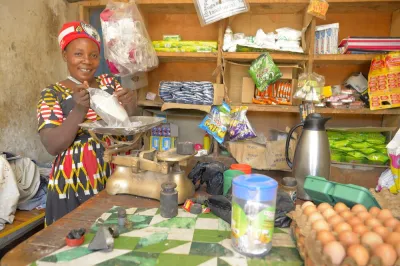Two Steps Behind: Social Inequality Poses a Challenge for Women’s Financial Inclusion in DR Congo

The data is new, but it tells a familiar story. A recent FINCA survey of clients in DR Congo shows that women entrepreneurs are confined to the smallest, least profitable businesses. This finding reflects the burden of unpaid work and other social factors that put women at a competitive disadvantage. While many organizations, including FINCA, are working to shift the ground in women’s favor, seeing the facts in hard numbers gives us a realistic picture of the task ahead.
Unpaid Labor Puts Women Behind
 Before venturing out of the house and into business, a woman has other tasks to accomplish. Standing between her and the door is a daunting pile of unpaid domestic obligations, including childcare, cleaning, gardening, fetching water, gathering wood and cooking. These activities, which have been valued between 10 to 40 percent of GDP, occupy more than four hours of a woman’s day, compared with 1.5 hours for men. In effect, by the time women get a chance to compete in business, men’s greater freedom of time and movement has given them a three-hour head-start.
Before venturing out of the house and into business, a woman has other tasks to accomplish. Standing between her and the door is a daunting pile of unpaid domestic obligations, including childcare, cleaning, gardening, fetching water, gathering wood and cooking. These activities, which have been valued between 10 to 40 percent of GDP, occupy more than four hours of a woman’s day, compared with 1.5 hours for men. In effect, by the time women get a chance to compete in business, men’s greater freedom of time and movement has given them a three-hour head-start.
Once they get past these family obligations, a woman will find that men already occupy the most lucrative business segments. Our survey in the DR Congo found that men dominate sectors like wholesale trade and manufacturing, while women compete among themselves in small trading businesses, where the profits and growth prospects are low.

Women-Owned Businesses are Less Profitable
We found inequaltiy across all sizes and types of businesses, but it is worse at the top. Women fare reasonably well in services, where men’s earnings are only 20 percent higher. The difference climbs to 70 percent in retail trade, and a whopping 400 percent in wholesale. A female wholesaler earns $31 per day, which is probably pretty good by local standards, but her profits are only fraction of the $100 that a man earns in similar activities.

This disparity points to other entrenched advantages that men enjoy, including a much higher rate of secondary education. Resistance from family members and safety concerns can restrict women’s movements and the range of activities that they can consider. Until a few years ago, the Family Code in DR Congo even forbade women to sign a contract or work outside the home without their husband’s consent. While the legal framework is gradually improving, cultural norms will take longer to evolve. These social factors have an observable influence on women’s entrepreneurial behavior such as a lower appetite for risk, more reasoned decision-making, and a drive for personal achievement over profits.
Despite these disadvantages, women can be among the best clients of a financial institution and its most successful banking agents. At FINCA, each day we can directly observe women’s propensity for thrift, their tendency to save, and proven discipline in meeting financial obligations. We also know, however, that the commitment to women's financial inclusion requires a vision that looks beyond near-term profits toward the goal of a more equal world—and a willingness to accept the costs of getting there.
In partnership with Global Affairs Canada (GAC), FINCA will be launching a top-to-bottom gender assessment in DR Congo to make sure that every aspect of the microfinance institution -from research and product design to advertising and service delivery - is geared towards women and, more importantly, helping them prosper. Client-level indicators, such as income and profitability, help us face this challenge with clear heads while keeping us focused on the most important outcomes.



Scott -- I will be quoting this blog because you put so succinctly and creatively some of the long-standing challenges that women have. I will now always think of women trying to get out of the house over a mound of obstacles related to cooking, cleaning, caring, advising . . . only to find that the men have taken all the best jobs, pitches in the marketplace, etc. It's a simple image that is very effective. The whole blog is just what I needed today: something clear that keeps me focused. Thank you.
Thanks very much, Johanna. I know that VisionFund is right there in the trenches on these issues, including DRC, with a strong social focus. Glad that this data is helpful and would be happy to share more if needed.
Kindly don't see the unpaid work as the only obstacle. Actually it's not the most compelling because if the business was profitable you can pay for a big number of such work but you follow up with business, but instead the social constructs are fixing the levels an acceptable woman in the society shouldn't go beyond. I neighbor Congo and usually I visit. A woman must be there for hubby meal, must organize some of the daily details of the house which tells you travelling far or spending long time outside her home is not allowed. Or can't be taken as normal as a a man. While actually the best margin are made by those who are ready to go to the source. The bigger is the number of middle men the smaller your margin is. And by the way it's not that women don't see that only that they fear to loose their acceptance in the community or named odious names if they are to focus on business. So let the truth be told if it was work alone we could find a substitute but the must be there is the one that kills it all. They could learn to leave kids in daily care, having helpers where possible and pay if that was agreeable in the house but men are not likely to be part of that agenda soon. So let learn on how to challenge the cultural norms that are not serving us. When a woman profit it's the whole family that benefits.
Thanks.
Leave a comment